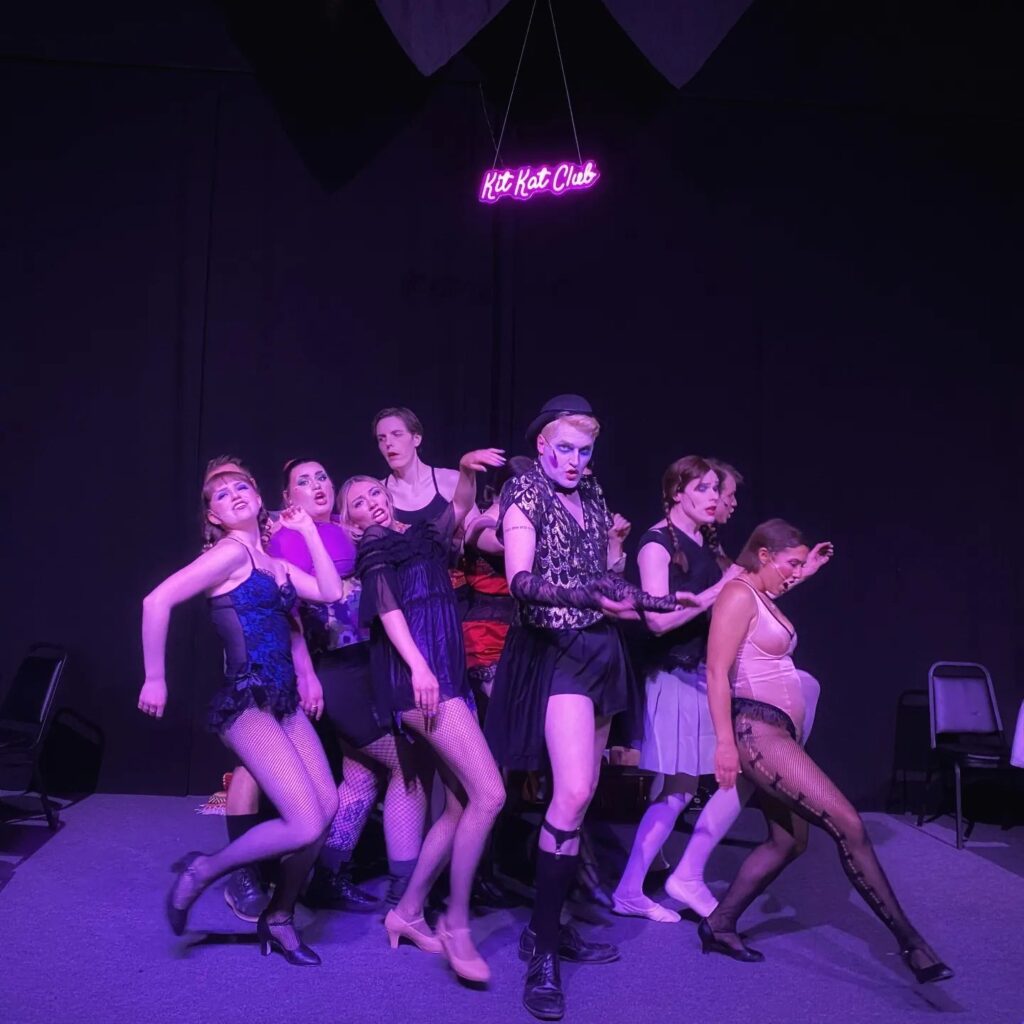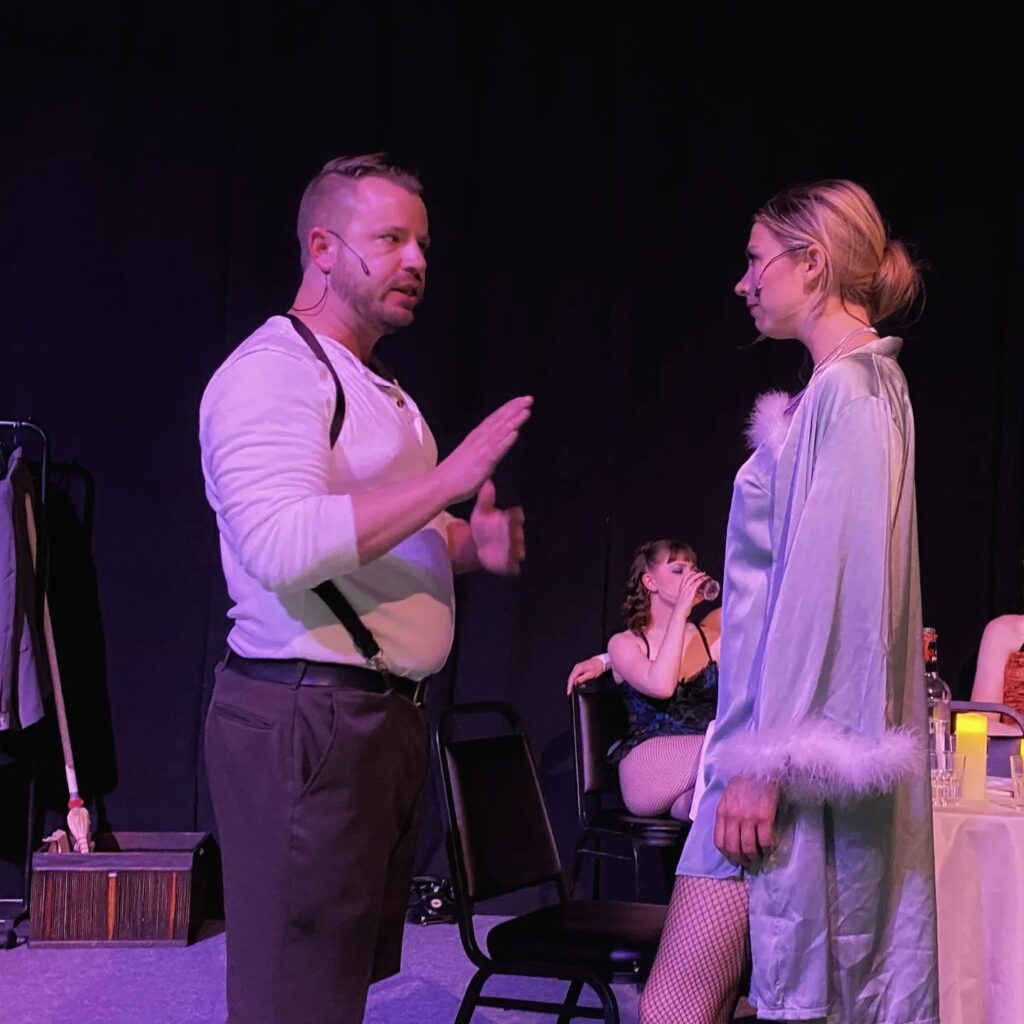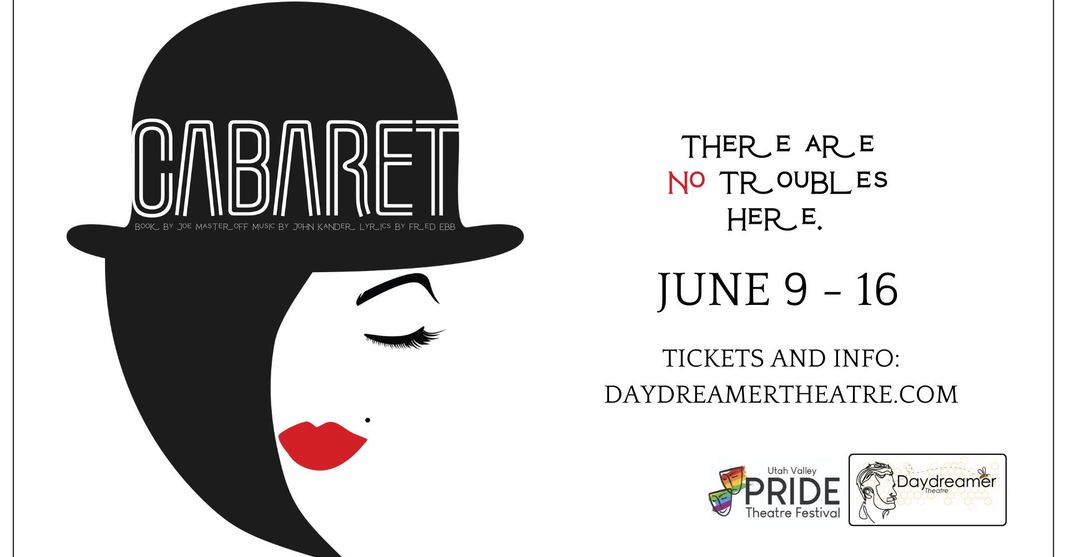By Kathryn Olsen
As part of the Utah Valley Pride Theatre Festival, Daydreamer Theatre has transformed The Towne Hub in American Fork into a 1930s German nightclub in Cabaret and it was a delight to attend for Front Row Reviewers. This acclaimed 1966 musical with music by John Kander and lyrics by Fred Ebb is supplemented by a book by Joe Masteroff, but is based on I Am A Camera by John Van Druten and Goodbye to Berlin by Christopher Isherwood. It won the Tony Awards for Best Musical and Best Original Score in its original run, while the 1972 film adaptation was awarded eight Academy Awards. I have loved the music for many years, but until last night, I had never journeyed to the Kit Kat Club; I walked the five blocks from my apartment and for a time-traveling experience.

As the lights come up and the snare drum rolls, the audience is introduced by the Emcee (Zack Elzey) to the surroundings and stage performers of a Berlin nightclub. It is a place where “we have no troubles here” and “even the orchestra is BEEEYOUTIFUL.” Headlining is English singer Sally Bowles (Brianna Meikle), whose performances always include some kind of saucy anecdote as well as a brave view of the world. Enter Cliff Bradshaw (Michael Howell), an American novelist who has looked for inspiration in London and Paris and is immediately befriended by Sally for their shared language. As the two fall in love, they share their lives with other members of the community outside the Kit Kat Club. Fraulein Schneider (Jordan Kramer) has strict rules for her boarding house and something of a crush on fruit vendor Herr Schultz (Rich Higenbotham), while Fraulein Kost (Ashlee Howell) makes a regular habit of bringing sailors back to her room and Ernst Ludwig (Michael Combs) comes around to learn English and engage Cliff in smuggling activities. The German world is on the brink of change with the Nationalsozialistiche Deutsche Arbeiterpartei gaining power and popularity and the Weimar Republic on the decline, but how this will affect the lives of those in Cliff and Sally’s world is yet to be seen.
While much of the story revolves around the two couples, it would be an injustice to not begin an assessment of this show with anyone but Elzey. The Emcee begins with the admonition to “leave your troubles outside” and ends with asking where his audience’s troubles have gone. If Cabaret were a one-person show, Elzey would still make it worth watching. He marvelously navigates the mood swings of the cast of characters from the gleeful “Wilkommen, Bienvenue, Welcome” that opens the play to the abrupt and sobering revelation of the Emcee’s future fate at the end, but one remarkable change to the original musical is of note. “Tomorrow Belongs to Me,” a Nazi-style patriotic anthem composed for the stage-play, is originally sung by a young waiter who is later joined by the others in the club. In this production, the Emcee is the one to begin the expression of pride and the song’s promise that “the morning will come when the world is mine, tomorrow belongs to me” is poignantly bitter because of the oppression and stripping of rights that face him. Elzey’s rendition in both the first performance and the reprise that closes Act I is a stark facing of dark days ahead and its contrast to the Emcee’s constantly-teasing patter is wonderfully done.
Howell’s Cliff is a man who possesses passion, but needs a worldly education. As the representation of the book’s author, Howell ties his temperament and allegiances closely to the changes in the world around him. One of his final lines opines that, in this story of Berlin, Germany, “it was the end of the world and I was dancing with Sally Bowles and we were both fast asleep.” His awakening from this dream is the central story of Cabaret and Howell is extremely effective in highlighting the distance it creates between him and the woman he loves.

His beautiful dreamer, as played by Meikle, is the poster girl for the esprit de corps that exists within the cabaret community. She is the one who can shut out the politics of the world and see Berlin as beautiful as tyranny looms on the horizon. Meikle’s quirky songs and dance numbers create a safe haven for people to find joy in the midst of fear and she strains throughout her love story to keep that up. Meikle’s performance of the famous “Cabaret” song brought me to tears, since it was performed as an expression of a crumbling dream and an aspiration to end life as “the happiest corpse” because of a life fully-lived.
Another personal favorite of mine was Fraulein Schneider. She travels a road from cynical indifference to defeat as she faces the reality of her love being a race crime under Nazi law and Kramer plays these extremes with great subtlety. Higenbotham, playing her beloved, is heartbreaking in his hope that difficult times will pass for him, even if he is one of the victims of anti-Semitic vandalism and is identified as no longer counting as a German.
Every story must have a villain and Combs is the man who puts into words the dangerously hateful ideologies of the Nazi party he joins. It is impossible to like the character even before he begins wearing an armband with a swastika on it, but Combs makes Ernst a character to both watch and suspect.
Of the entire cast, only the Emcee and Sally are cast in single roles and the ensemble is charmingly versatile, whether as a dancer who becomes a train Customs Officer (Viviane Turman) or one of the Cabaret boys who also plays the Nazi character. Gender fluidity and other issues of identity and orientation have always been a part of Cabaret’s productions and this is true in the staging and casting. The ensemble, rather than being background characters, are merely players who are not the focus of Cliff’s interest.
Director Kasey Spadafora and Assistant Director Alexis Boss make great use of a dynamic cast and a small space in this production. Choreographer Chantelle Wells’ work, supplemented by the original choreography for one number by Bob Fosse, is clever and period-appropriate. One of the most effective collaborations is that of the lighting and sets and the costuming, designed respectively by the director and Pan Lynn Arcadia; the characters almost all stay in the same dance costumes for the duration of the play while jackets or hats allow them to change character or authority. It also gives the sense that we are all behind-the-scenes at this charming nightclub. Amelia Rose Moore is the efficient Music Director who brings out the best in the performers, while conductor Abby Jackman helms the orchestra that shines especially in the Entr’acte.
As part of the Utah Valley Pride Theatre Festival, Cabaret is a wonderful way to draw attention to the history and challenges of LGBTQIA2S+ individuals and a significant aspect of the program is that the director foregoes the Director’s Note in favor of articles that highlight the ways in which bigotry is still having widespread effects and the ways in which communities can be of better support. The reading material is thought-provoking and worth perusing at any moment.
This is not a show for young audiences, as it contains strong sexuality, some violence, and references to termination of a pregnancy.
Cabaret will be playing until June 16, so there is plenty of time to catch the train to Berlin for a night’s entertainment and a gay escapade. Leave your troubles outside and catch this show now.
Daydreamer Theatre Presents Cabaret; Book by Joe Masteroff, Music by John Kander and Lyrics by Fred Ebb, based on the play by John Van Druten and the book by Christopher Isherwood.
The Towne Hub, 420 W Main St, American Fork, UT 84003
June 9-16, 2023, 7:30 PM
Tickets: $19
www.daydreamertheatre.com
www.utahvalleytheatrefestival.com
Contact: Daydreamertheatre@gmail.com
Daydreamer Theatre Facebook Page


0 Comments